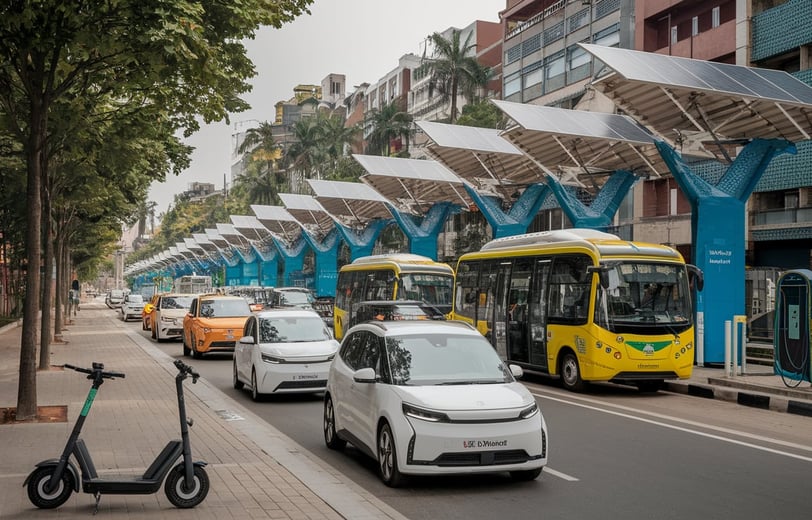Telangana EV Registration: 4,000+ in 43 Days
Discover how Telangana has registered over 4,000 electric vehicles in just 43 days, highlighting the region's commitment to green mobility. Explore the policies, challenges, and inspiring stories that are driving this transformative leap in electric vehicles in Telangana.
evnivatech.com
12/29/20245 min read


Electrifying Telangana: Over 4,000 EVs Registered in Just 43 Days—A Paradigm Shift in Green Mobility.
Introduction: A Landmark Surge in EV Adoption
Telangana is rapidly establishing itself as a forerunner in India’s green mobility landscape. Within a mere 43 days, the state witnessed the registration of over 4,000 electric vehicles (EVs), underscoring a pivotal transformation in its transportation sector. This unprecedented growth reflects the confluence of progressive policies, technological innovation, and a rising collective consciousness about sustainability. This article explores the underlying dynamics of this surge, offering a nuanced analysis of its causes, implications, and the road ahead.
Telangana’s EV Revolution: A Holistic Perspective
The remarkable spike in EV registrations serves as a testament to Telangana’s strategic foresight in fostering an eco-friendly transport ecosystem. By combining robust policy frameworks with extensive public outreach, the state has managed to bridge the gap between awareness and action.
A Quantitative Leap
Over 4,000 EVs were registered in Telangana in just 43 days, bringing the total count for 2024 to over 50,000. Urban centers like Hyderabad dominate this growth, driven by escalating concerns over air quality and traffic congestion. However, smaller towns and semi-urban areas are catching up, spurred by focused government interventions and the efforts of private stakeholders.
Catalysts of Change: Decoding Telangana’s EV Boom
Several synergistic factors underpin the exponential rise in EV adoption. Below, we dissect the most significant contributors:
1. Progressive Government Policies
Telangana’s policy initiatives are at the heart of its EV revolution. Key measures include:
Subsidies: Substantial financial incentives on EV purchases, effectively lowering the initial investment barrier.
Tax Waivers: Comprehensive exemptions on road tax and registration fees for EVs.
Strategic Frameworks: The Telangana Electric Vehicle and Energy Storage Policy, 2020, which aims to establish the state as a premier hub for EV production and adoption.
These policies not only address affordability but also create an ecosystem conducive to innovation and investment. Notably, Telangana’s concerted efforts to attract global manufacturers have resulted in substantial job creation and economic growth.
2. Expanding Charging Infrastructure
Accessibility to charging infrastructure is pivotal for fostering confidence among EV buyers. Telangana has made significant strides in this regard:
Deployment of over 500 charging stations in urban areas.
Strategic collaborations with private enterprises to augment the network in peri-urban and rural zones.
Introduction of solar-powered and mobile charging units to enhance energy efficiency and reach.
Such initiatives are seamlessly aligning the state’s renewable energy goals with its mobility aspirations, fostering a model of sustainable development.
3. Economic Viability
Rising prices of conventional fuels have amplified the cost-effectiveness of EVs. When juxtaposed with their minimal maintenance requirements, EVs emerge as an economically superior choice for daily commuters and commercial operators alike. This financial calculus has been instrumental in driving mass adoption.
4. Rising Environmental Awareness
A heightened awareness of climate change and environmental degradation has inspired many citizens to transition to greener alternatives. Targeted awareness campaigns, often leveraging digital platforms, have successfully galvanized public support, especially among younger demographics.
5. Technological Advancements
Advances in EV technology, including longer battery life, faster charging capabilities, and enhanced vehicle performance, have mitigated early consumer apprehensions. Local startups and research institutes are playing a pivotal role in these advancements, ensuring that the technology remains accessible and adaptable to diverse use cases.
The Role of Local Innovators: Manufacturers and Startups
Telangana’s burgeoning EV sector owes much to its vibrant ecosystem of manufacturers and startups. These entities are not only addressing domestic demand but are also positioning the state as a significant player in the global EV market.
Spotlight on Hyderabad’s EV Startups
Hyderabad has emerged as a nexus of innovation, hosting numerous startups focused on:
Affordable two- and three-wheelers for urban and rural markets.
Development of high-performance batteries with extended lifecycles.
Smart charging solutions leveraging AI and IoT.
Integration of connected technologies for enhanced user experience.
Collaborations with academic institutions further amplify the impact of these startups, creating a skilled workforce and fostering a culture of continuous innovation.
Addressing Challenges: Navigating Roadblocks to EV Adoption
While the growth trajectory is promising, Telangana’s EV sector faces several challenges that require strategic interventions:
1. Infrastructure Inequities
Despite significant progress, rural areas still lag behind in charging infrastructure. Bridging this gap necessitates targeted investments and innovative solutions, such as portable charging units and subsidies for home charging installations.
2. High Initial Costs
The upfront cost of EVs, even with subsidies, remains a deterrent for some consumers. Scaling production, fostering competition, and introducing flexible financing options can help address this issue.
3. Battery Lifecycle and Recycling
Concerns around battery longevity, range, and environmentally responsible disposal persist. Telangana is proactively exploring partnerships to establish battery recycling plants, aiming to close the loop on EV sustainability.
4. Public Perception and Awareness
Misinformation and skepticism continue to pose barriers to EV adoption. Comprehensive educational campaigns, alongside pilot programs demonstrating EV efficacy, can play a crucial role in overcoming these hurdles.
Testimonials: Voices of Telangana’s EV Owners
The transformative impact of EV adoption is best captured through the stories of those who have embraced it:
Priya Reddy, Hyderabad
“My EV has transformed my daily commute. It’s economical, environmentally friendly, and surprisingly convenient. The growing network of charging stations makes ownership stress-free.”
Rahul Sharma, Warangal
“Switching to an EV was initially daunting, but the savings on fuel and maintenance have been phenomenal. The state’s proactive measures reassured me that this was the right choice.”
Lalitha Devi, Nizamabad
“As a small business owner, my electric three-wheeler has been a game-changer. It’s cost-efficient and reliable, and the subsidies made it an affordable investment.”
Broader Implications: Economic and Environmental Impact
The ripple effects of Telangana’s EV revolution extend far beyond individual users, influencing both economic and environmental domains:
Economic Upswing
Job Creation: The EV industry is generating employment across manufacturing, research, and service sectors.
Startup Growth: Favorable policies are nurturing a thriving ecosystem of innovation.
Export Opportunities: Telangana’s growing production capabilities position it as a potential exporter of EV components.
Environmental Gains
Emission Reductions: The substitution of conventional vehicles with EVs significantly curtails greenhouse gas emissions.
Cleaner Urban Environments: Decreases in air and noise pollution enhance the quality of life in cities.
Renewable Integration: Leveraging solar and wind energy for EV charging amplifies sustainability.
Envisioning the Future: Telangana’s Next Steps
Telangana’s roadmap for the EV sector is both ambitious and pragmatic. Key focus areas include:
Electrification of Public Transit: Scaling electric buses and metro feeder services.
Integration with Renewable Energy: Increasing the deployment of solar-powered charging stations.
Enhanced Public Engagement: Broadening awareness campaigns to reach diverse demographic groups.
Incentivizing R&D: Supporting innovations that enhance affordability and performance.
FAQs: Comprehensive Insights into Telangana’s EV Journey
Q1: What types of EVs are popular in Telangana?
Two-wheelers and three-wheelers dominate the market, driven by their affordability and practicality.
Q2: How accessible is charging infrastructure?
Urban areas have robust networks, and rural regions are catching up through targeted initiatives.
Q3: What incentives does the government offer?
Subsidies, tax exemptions, and waived registration fees are key incentives for EV buyers.
Q4: Is the EV surge limited to urban areas?
No, while urban centers lead, smaller towns are witnessing steady growth due to expanding infrastructure and outreach.
Q5: What are the state’s future plans for EVs?
Expanding mass transit electrification, integrating renewable energy, and fostering innovation through R&D are pivotal goals.
Conclusion: Pioneering a Sustainable Tomorrow
Telangana’s swift adoption of EVs exemplifies its commitment to a sustainable future. By seamlessly integrating policy, technology, and public engagement, the state is setting a benchmark for green mobility in India. As Telangana accelerates toward an electrified future, it not only transforms its transportation sector but also inspires a broader shift toward sustainability and innovation.
